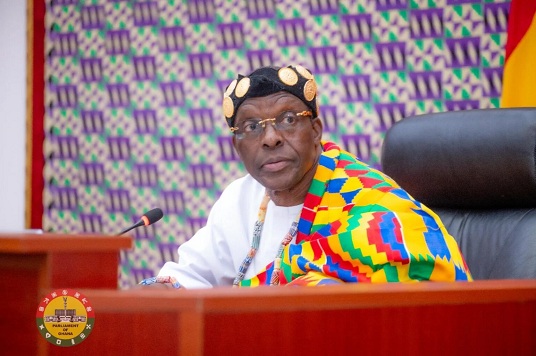Speaker of Parliament Kingsford Sumana Bagbin has issued a formal apology to the judiciary following what he described as “discourteous” and “disrespectful” conduct exhibited by some Members of Parliament during the vetting of Chief Justice nominee Justice Paul Baffoe-Bonnie.
Addressing the House, the Speaker said the conduct of certain MPs during the Appointments Committee proceedings was unacceptable.
“My attention was drawn to a few things and I have come to deliver an apology on behalf of the Parliament of the Republic of Ghana to their Lordships and Ladyships and the members of the judiciary who were present during the proceedings”.
“Such conduct, though not representative of the collective will of Parliament, is regrettable and inconsistent with the decorum expected of members under the standing orders of the Parliament of Ghana”.
He reminded lawmakers of the need to maintain decorum and discipline during plenary and committee sessions.
“Honourable members, the standing orders require us to maintain order and decorum in the House and in committee, and to refrain from offensive, insulting, or unbecoming language,” he said.
He further cited Order 123, Rule 3, which cautions members against imputing improper motives or using language that is disrespectful or likely to offend.
The vetting session was marked by drama as the Minority Caucus, led by Alexander Afenyo-Markin, staged a walkout in protest.
Their departure followed a heated exchange between Afenyo-Markin, who serves as Ranking Member of the Committee, and Majority Leader Mahama Ayariga.
What began as procedural remarks quickly escalated into a spirited debate over parliamentary rules, judicial independence, and the boundaries of legislative oversight.
In an effort to ease tensions, Mr Bernard Ahiafor, the Committee Chairman, called for a “cocoa break,” allowing members to cool off before proceedings resumed.
Justice Baffoe-Bonnie’s nomination comes at a critical moment for Ghana’s judiciary, which has faced questions about independence and public trust.
His pledge to uphold fairness and accountability will be closely scrutinised as Parliament deliberates on his approval.
If confirmed, he will inherit the responsibility of steering the judiciary toward greater openness and efficiency, ensuring that justice remains accessible and impartial for all citizens.





